As the boys of Significant Others piled into my studio apartment, cautiously asking if they needed to remove their shoes, they brought in a very interesting energy. One that somehow immediately calmed down a majority of my pre-interview nerves. There was nothing in particular that they said or did. And yet, as they sat down on my couch, cautiously aware that this was not their home while also quickly feeling as comfortable as if it was, an easy energy seemed to sit with them.
What followed was an hour of humor, camaraderie, vulnerability, and insight into the creative minds behind the incredible band.

Before the interview, drummer Ziggy Ziegler pointed out the singular vinyl sitting on my bookshelf; the self-titled debut album from Harry Styles. I admitted it was the only record I owned and also that I did not have a record player. This lead to a surprisingly passionate five minute conversation, off the record, about which Harry Styles albums and songs were everyone’s favorites. Lead singer and guitarist Clayton Patterson proudly announced his was the debut album, with bassist (and sometimes vocalist) David Seiler saying Fine Line simply, and definitively. Ziegler remained mostly quiet during the ordeal, and lead guitarist Michael Glowatski admitted he didn’t know who Harry Styles was (except for ‘Watermelon Sugar’).
I handed Patterson a tiny microphone, which he handed to Seiler, who proceeded to put it as close to his mouth as he could and ask “Is there feedback?” I told him it was connected to my phone, to which he promptly responded “Sorry!” in a sing-song voice, equally as close to the microphone as before. They all settled on a good mouth-to-microphone distance, once Seiler concluded a quick ASMR session.
For the next 27 minutes of the interview, the boys curated a perfect blend of well-spoken, careful, vulnerable answers with a casual humor, so obviously and innately shared amongst themselves. They interacted with such a natural rhythm, rarely speaking over each other and often agreeing with what one another had to say. Considerate, thought-out answers would be followed up with quick-witted jokes or small comments that erupted with laughter.
It was evident that they all understood each other on an integral level, and they deeply respected each other.
It gave me a group of people I could be close with.
David Seiler,Bassist
All the boys came from musical backgrounds, though they were relatively different in nature. “I grew up in a really small town in Alabama,” Patterson told me. “One of my neighborhood friends pulled out an alto saxophone one day and I thought ‘I wanna do that’.” His parents tried to get his siblings to play instruments, which was a “futile effort”. However, fortunately, this allowed him to begin his journey into music.
Seiler, on the other hand, surprisingly got his start in his school’s choir. “I did that- I did acapella! Livin’ that Pitch Perfect life,” he joked, detailing his choir experience from his senior year of high school. “And then, in the midst of quarantine I started playing guitar – as most people did. And then I moved here and, just, kept going at it.”
“My dad’s always played guitar,” Ziegler began. “But the real story is I had a crush on this girl in Kindergarten… We were both in Kindergarten!” He unnecessarily and hilariously clarified, causing everyone in the room to burst out laughing. While the others kept trying – and failing – to stop laughing, Ziegler continued, saying that the girl told him ‘I like boys who play drums.’ “And that’s how I became a villain,” he joked.
“I was just involved with my school orchestra,” Glowatski stated simply. “I played the string bass fourth [grade] through eleventh grade, and then I picked up other instruments as I went along. And then I stuck with guitar.”
“Were we all in orchestra or band?” Ziegler asked, to which Seiler passionately exclaimed “Noo, I was a choir kid.”
“I was in Jazz Band,” Patterson clarified.
“I was in Vocal Jazz!” Seiler excitedly added in response, as if to emphasize their connecting origin stories. “I was scatting.”
Despite the differing background and hometowns, the boys came together in Tempe, Arizona.
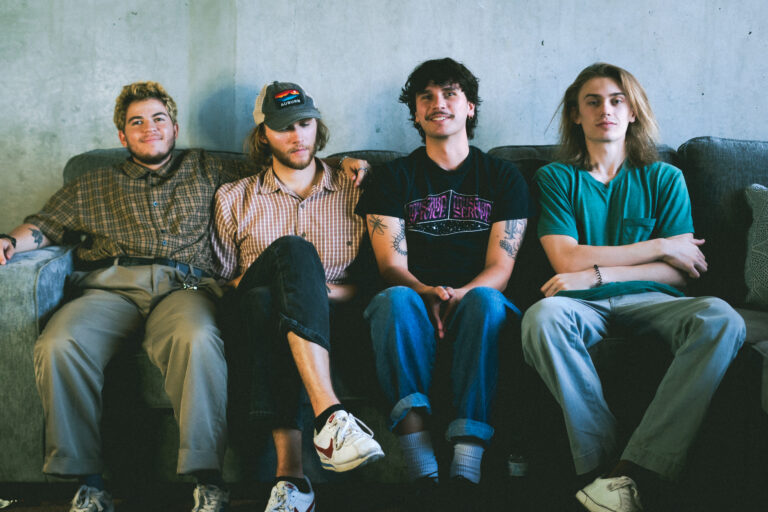
Whether or not you believe in fate, sometimes the perfect people come together in a random instance that feels destined. Other times, the people are forced into our paths. That’s exactly how Patterson and Seiler met in Manzanita Hall their first year at Arizona State University.
“I can take the lead on this one,” Seiler hailed, after I asked how the band met. “I moved [to Arizona] in August of 2020 to go to ASU and I moved in pretty early, cause I was in the midst of pretty heavy quarantine rules in [Sacramento] California … I didn’t really meet anyone cause no one was there.”
“A couple days later, students were moving in and [a TA] happened to be working the front desk and was like ‘Hey David, have you met anyone yet?’ and I was like ‘No!’ So then she pointed at someone in the lobby and was like ‘Hey, be his friend.’ And it was Clayton.”
Seiler recalls asking Patterson to teach him guitar since he was “way better at guitar” than Seiler was at the time. Spring semester of 2021, Patterson met Glowatski in Sustainability class. Despite being the more introverted of the bunch, Glowatski was the one who reached out to Patterson. Seiler recalled he asked Patterson if he played guitar, but Glowatski quickly corrected him, saying he asked him for his spotify.
“His spotify? Oh wow,” Seiler exclaimed, completely sarcastically.
“That was a big step,” Patterson retorted.
“He had a crush on you for that,” Ziegler chimed in.
“We talked about 90’s hip-hop,” Patterson explained as he grabbed the microphone from Seiler to tell his side. “And then, we were out in this garden one day on campus, and he just came up to me and was like ‘You play guitar, right?”

Once the pair asked Seiler to officially be their bass player, all they were missing was a killer drummer to bring their band to life. And what better way to complete a band than a drummer needed poster on campus? According to Ziegler: maybe responding when someone reaches out.
“I was so upset because I listened to it and I was like ‘Wow, I love this.’ And then when I messaged Clayton he didn’t message me for two days,” Ziegler lamented, clearly moved on from the whole situation. “Then he was like ‘Oh hey, you wanna come practice with us tomorrow?’ And I was like ‘Yeah’. So… Now we’re in love.”
It was in that moment I think I realized Ziegler was the comedic voice in the group. His favorite brand of jokes involved deliberately picking fun at how close the group was, oftentimes teasing that they were in love or cooing at how cute somebody was for their answer. Though they were clearly jokes – ones that made everyone smile, chuckle, or even burst out laughing – there was a layer to them. The four men had grown quite close in the years since that first practice, creating a bond they all hold dear.

“It was really difficult to feel like this place was home, especially moving away,” Seiler admitted vulnerably. “I can’t speak for- as far as Clayton or Mike, moving across the country. In the midst of COVID it was difficult to meet people. So this gave me an opportunity to be closer with a group of friends.” It seemed like a simple statement, said casually, but it held a weight to it. One all of the boys felt.
“To speak to how it changed me as a musician,” Patterson began, with a distinct tone in his voice. It was mature and, yet, not definitive. It was almost as if he had meant to say something about how it’s changed him thus far, knowing he wasn’t done growing yet. “I was never one to play out for people or for a crowd, especially in high school . . . Once Mike approached me, I started being really vulnerable with him and showing him all my songwriting and I think that’s where the group kinda became a more aligned group…”
“To speak towards everybody’s ability and musicianship,” he continued. “It really took off from there. David progressed at bass so godd*mn fast. When I met Mike he was already a really good lead guitarist and I- I don’t even understand how he does this. I swear he’s the best guitarist in town,” Patterson exclaimed, to which Seiler and Ziegler both audibly agreed with while Glowatski blushed silently. “I don’t know where we’d be without him.”
“I think we’ve all changed a lot since we met each other, and I think the band has been the thing keeping us going and perfecting our craft, really.”
Thoroughly satisfied with Patterson’s answer, they all looked around at who would speak next and finally Glowatski took the microphone. “I think on a similar note,” he began. “It was kind of a productive hobby I had and the only excuse I had to get involved with anything community related in Phoenix. Otherwise I probably would’ve just moved here, done school, and then not really got involved with anything aside from that.”
For Ziegler, the band broke him out of his musical comfort zone. “I feel like it was kind of weird for me playing indie music,” he admitted. “I listen to indie music but before I joined the band I had just finished a season of drum corp. So I was super choppy and wanted to play a lot of 1/16ths and difficult stuff and Clayton would be like ‘Stop that!'” This memory earned a chuckle from everyone, especially Patterson. “Playing with other local bands,” Ziegler went on. “You learn their style and how to incorporate their style into your own music.”
“I feel like, overall, we’ve just grown as people because we’ve known each other through so many pivotal points in our lives and it’s nice to have a good support system to do that with.”
We've all changed a lot since we met each other and I think the band has been the thing keeping us going and perfecting our craft, really.
Clayton Patterson,Lead singer/Guitarist
Listening to these boys speak about themselves and each other, and being in their presence for just one hour, it was clear to see why they worked so well. There was a unspoken system, each person assigned a trope. Whether they were conscious of it or not, I’m not sure. But it’s there.
Musically speaking, Patterson is the frontman. Within the group dynamic, something about that role shifts him into a sort of… not so much a father, given all of them are the same age and share a relative level of maturity, but something in that realm. You feel it in the weight of his words as he speaks about himself or about the band, and you see it in his eyes as he listens to people when they speak. He cares about people and his art deeply, in an inspirational way. Without fail, he was always quick to throw a compliment to a fellow band member whenever he could.
Seiler is a leader, through and through. He carries a strong presence with him, one I felt as soon as he walked through the door. It’s not in a hierarchal way, but simply in the way he presents himself and interacts with the band. They all do a great job listening to one another and working together, but Seiler is always willing to make a suggestion, or answer a question first. He speaks casually, even when what he is saying is heavy, as if he is so sure in what he’s saying that it doesn’t need anything else. And it doesn’t.
A running joke in the band revolves around Glowatski’s stage presence, which can lean a bit stoic sometimes. However, while rather quieter at times, chiming in a few funny digs or quickly adding a point to someone’s, he is an upbeat person. It is more so as if he has simply mastered the art of only speaking when you feel you have things to say. But when he does speak, it’s simple and perfect. What needs to be said gets said, and that’s that. But he is also very funny, and an extremely tenative listener. His smile and his laugh are infectious and, because of his demeanor, they always make you feel like you earned it.
They interact so simply, but they are so deeply comfortable with one another, and they bring out the best in each other. It’s hard to believe they met 4 years ago and haven’t known each other their entire lives.
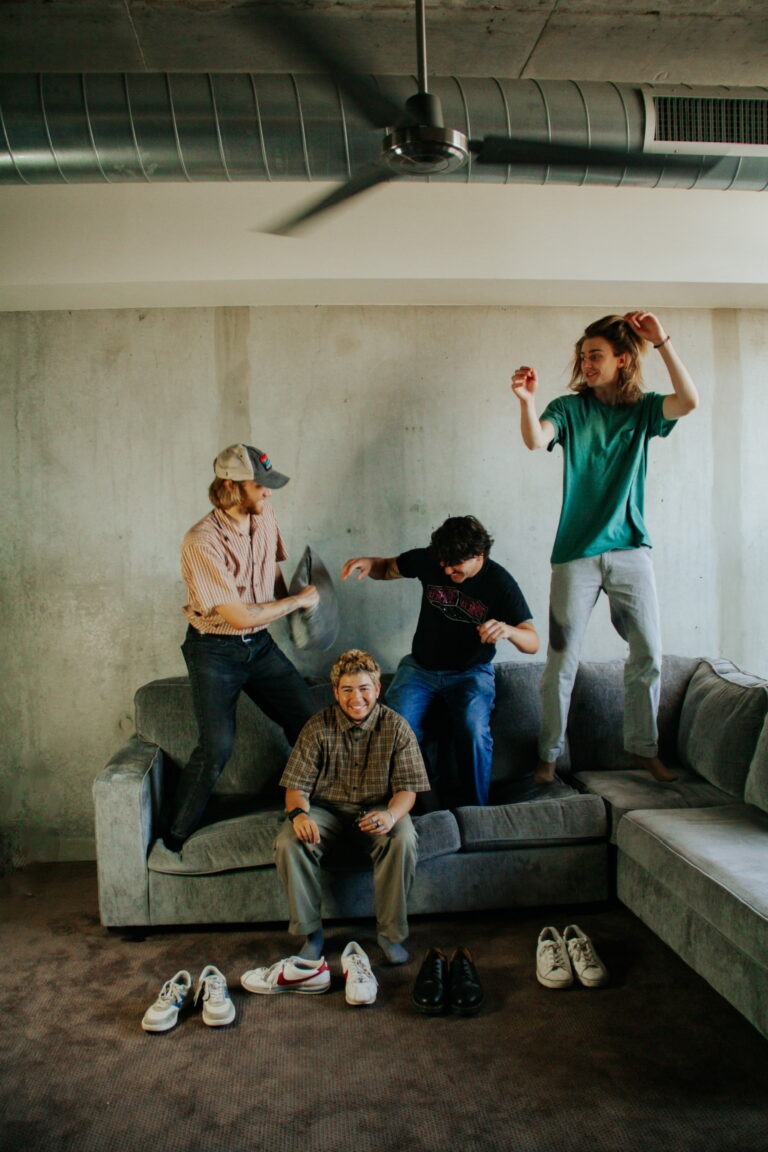
May 6th, 2022, Significant Others released their first EP Stick Figures. The 19 minute and 21 second EP was a beautiful taste of what the band was capable of. “Screen Time”, the most streamed of the tracks, opens the track with an incredibly fun, upbeat track that you’re sure to hear everyone singing along to at their shows.
After that release, the band quickly got back to recording and released their single “People Talk”, along with a music video. The track keeps the same upbeat, West Coast indie sound, and became a loved track around Phoenix.
From then on they released their single “Stuck In My Head” off their first official album, their second single off the album “Ocean Blues”, their third single off the album “Ginny’s Pool”, and finally, on May 12th, 2023, the band released Significant Others. The album, spanning 41 minutes and 14 seconds across 11 songs, is an incredible piece of music – even if you don’t know the boys personally. But when you do, you pick up on Glowatski’s insane guitar skills, you hear Ziegler’s mellow but powerful drumming, you notice Seiler’s consistent and strong bass, and you feel Patterson’s vulnerability in his voice.
“It starts with this guy,” Seiler said with a smile, handing the mic to Patterson.
“I’m a very slow songwriter,” he admitted, though it wasn’t with an insecure or embarrassed tone. It was matter-of-factly, and confident. “I’ll start with a chord progression and then write one verse and then put it away for a couple months. And I’ll do that over and over again. Then I’ll come back to it and finally finish it off a caffeine high or something.”
The song then gets sent to Glowatski for a stamp of approval in the form of a thumbs up or radio silence. “Mike’s the gatekeeper,” Ziegler joked, getting everyone, including Glowatski, to laugh.
“At this point we all know what needs to be added to a song,” Patterson continued. “There’s no one director that’s telling people what to do. I think everyone knows sonically what we want out of each song – which I super appreciate as a songwriter.” As if to echo the truth of the statement, they all looked around silently to see if anyone had anything else to build onto the statement. After a moment, Patterson definitively said “I think that answers that.”
Regarding our second album, regardless of how it does or how many people it reaches, we’re all very happy with it and thats something I think we’ve been successful with.
Glowatski
Seiler went on to tell me an anecdote of their first few practices they held in their house back in Tempe. “We were so loud,” he admitted proudly. “I remember so vividly when we first started, Mike had this fuzz pedal. And every time he’d click it on for a solo, the walls would shake. Pictures would fall off the wall. We did get the police called on us.” He told the story with such an excitement and the boys all laughed as they reminisced for a few minutes. But Seiler had a point to make.
“To that matter, Mike would bring a riff in or Clayton would have something that he sent in the group-chat. . . I’ll have something in mind. I’m sure when Ziggy hears it, he has a drumbeat in mind, if Mike’s already heard it I’m sure he has a leading riff in mind. And then it all gets put together,” he explained. “We record a very… interesting demo with our voice memos on our phone where its the worst quality ever but its there! And from there we curate it.”
The process sounds so easy for them, like they all come up with a song in their heads and when they put it together it somehow was already the same song. As I listen to them talk and hear their process and watch them interact, it is genuinely hard to believe that they ever disagree about anything.
“We’ve gotten in arguments over creative stuff. Like even {Only The} Bad Bones Break, even the title of the album-,” Ziegler admitted, to which Patterson added: “Yeah, things creatively speaking like artwork, or album covers, or titles-,” to which Seiler interrupted: “Yeah, its not music. Its always the other side of it-” to which Glowatski interrupted: “Its the stuff that we’re not good at.”
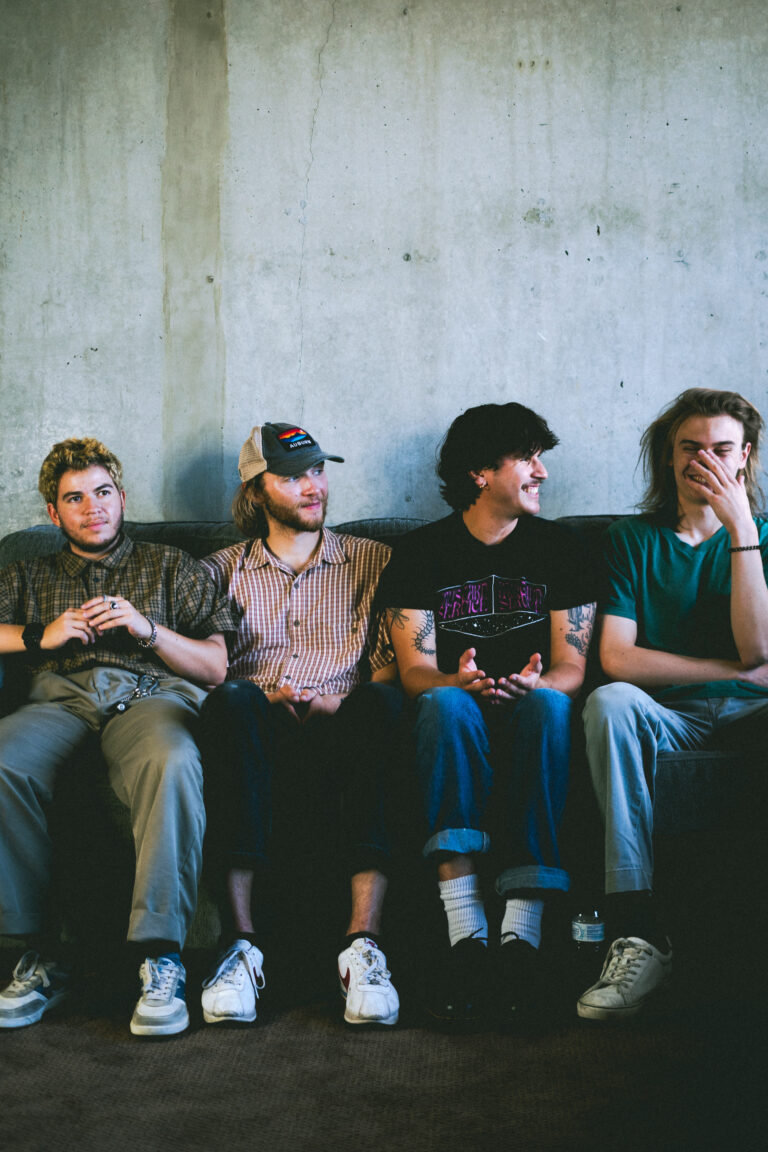
All of the boys break out into laughter. Seeing them all so excited to laugh at their own faults that they interrupted each other, for practically the first time, was a strangely intimate moment. When they normally answered questions, they remained casual, all giving each other a turn to speak completely and answering relatively concisely. But something about getting to pick fun at themselves broke down a wall.
Once the laughter died down, Patterson eventually tell me that they did get pretty heated sometimes but it never affected their friendships outside of the band. “I do think we do a good job at separating band from friendship. Even if it does get heated, we’re able to end practice and have a normal conversation and hang out. It’s not something that’s dividing us,” he said, to which all the boys agreed. “But it does get pretty heated sometimes – for the best though.”

When you’re at a Significant Others show, there is a love that fills every venue – off the stage, and on. All of the boys talk about community and how they wanted to be apart of something. And they are. Something beautiful. Fans scream along to their songs, they dance with their friends, they watch the boys with such adornment and excitement. On stage, the boys lose themselves in the music, in each other. Their shows are entertaining.
“I just try to focus {while I’m on stage},” Glowatski admitted. “Some of my parts are difficult to nail the way I want them to.”
“We have a ‘Mike-Moving’ quota every show,” Seiler joked. “Its my personal goal to make him smile a couple times. Clayton is obviously singing and engaged. And I’m always looking at these two to try and get them up and going. Ziggy’s great, he’s always responsive and then Mike is just-” He does this smile, imitating Glowatski, that makes all the boys laugh in agreement. Glowatski proves his point, unconsciously smiling at the joke in the exact same way.
“I have heard a lot of people who are like ‘Who’s that man?’ He’s kinda mysterious,” Patterson says, half joking and half dead-serious.
“The mysterious lead guitarist,” Glowatski echos, as if it to see how the term tastes in his mouth. He smiles a bit shyly, like he’s trying to pretend he doesn’t like it, though a part of him does.
There’s a truth to it. As Glowatski performs, he seems lost in the music. He’ll flip his hair a few times, look out into this crowd with this stare that’s hard to articulate. Not like he remembers they’re there, but like it brings him back into the moment and he’s reminded of why he’s doing this. When he plays, there’s not a single moment where you think he’s focusing on his part. He strums his guitar, playing insanely technical riffs, with incredible ease. There is an air of mystery that floats around him, even if you so happen to catch his eye.
The people that I've met or the people I know I'm gonna see at a show, it just makes me feel welcome.
Seiler
The way music makes listeners feel can also hit those who wrote it just as hard. Ziegler sits in the back of the stage, hitting his drums, fighting back tears. Kidding! Kind of… “Especially recently, I feel like the lyrics have been hitting a little bit deeper,” Ziegler admitted. “When I’m playing and I can feel the lyrics it makes me play out more. You can tell when someone is playing drums just to keep time and when they’re really playing drums.”
“I play to the crowd,” Patterson told me, but also, in a way, telling the boys. “The bigger the crowd, the better we play. And if I’ve had a really sh*tty day, I play a lot better.”
“Its changed for me, for sure,” Seiler began. “I was genuinely terrified when we first started playing. I think the first couple shows, that’s a shared thing for all of us. We were just kind of frozen and doing our best not to cry. Stage fright was a big thing for me and then getting over that was tough. I think it went from focusing on not f*cking up and not making a fool of myself to putting on a good show.”
“I can’t even see the crowd,” Ziegler chimed in, the boys all laughing.
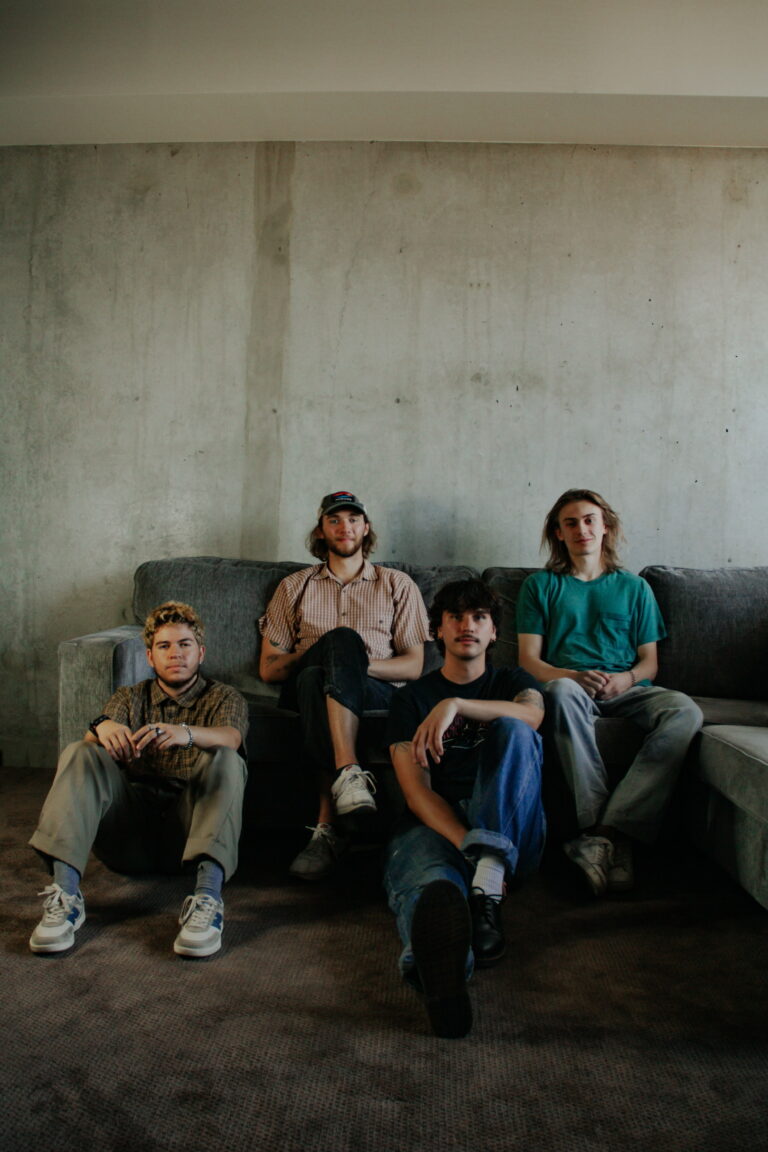
“I think the more success we’ve had, the more willing I was to be vulnerable with songwriting and lyrics,” Patterson stated. “I think personally, its definitely a relationship I had with music and its sometimes a love/hate relationship, sometimes I just don’t wanna write anymore and i just wanna do other hobbies or go explore other avenues of life. The one thing that always draws me back to it is these guys . . . I think it is the togetherness that keeps us going.”
The idea of success is one that plagues anyone willing to throw themselves into their art. Financial success is far and few in between, and while it’s what many artist strive for eventually, something tethers them to the art they make in the beginning. Something else has to motivate them to continue their journey. Something has to fuel that.
As soon as I asked the boys what success looks like to them, Patterson spoke up. “As long as we’re making people happy, I don’t really care if we’re still around 5 years from now, as long as we made a difference in somebody’s life or day. We’ve certainly made a difference in our life… As long as we’re still enjoying it – to me – that’s success.” All of them let that sit in the air for a moment. It’s something they all feel. “At this point,” Patterson continued after a moment. “We just recorded our second album and to me that is success creatively. At the end of the day, its whatever makes you happy and it does for me.”

“Making something I’m proud to show,” Seiler said simply, before expanding on the statement. “Not only that, but being able to share that – whether thats digitally or performing – having the ability to do that and have people willing to listen.” He says it with a seriousness in his voice that rings through the statement. It can be easy to forget, as a listener, how much work and energy goes into making music. Sharing that music also takes a level of vulnerability, one that never seems to be lost on these boys.
“Regarding our second album,” Glowatski responds. “I think regardless of how it does or how many people it reaches, we’re all very happy with it and thats something I think we’ve been successful with.”
“There’s nothing to add or take away,” Ziegler adds simply.
There is a clear success the boys have had. People are listening to their music, and they enjoy it. People come to their shows and they watch them play with a genuine feeling of excitement to be there. Music is not an easy industry to navigate, especially when you start from the ground up. But there is so much potential in the world that when you have a love for it, it is stupid to not go for it. And Significant Others are not stupid.
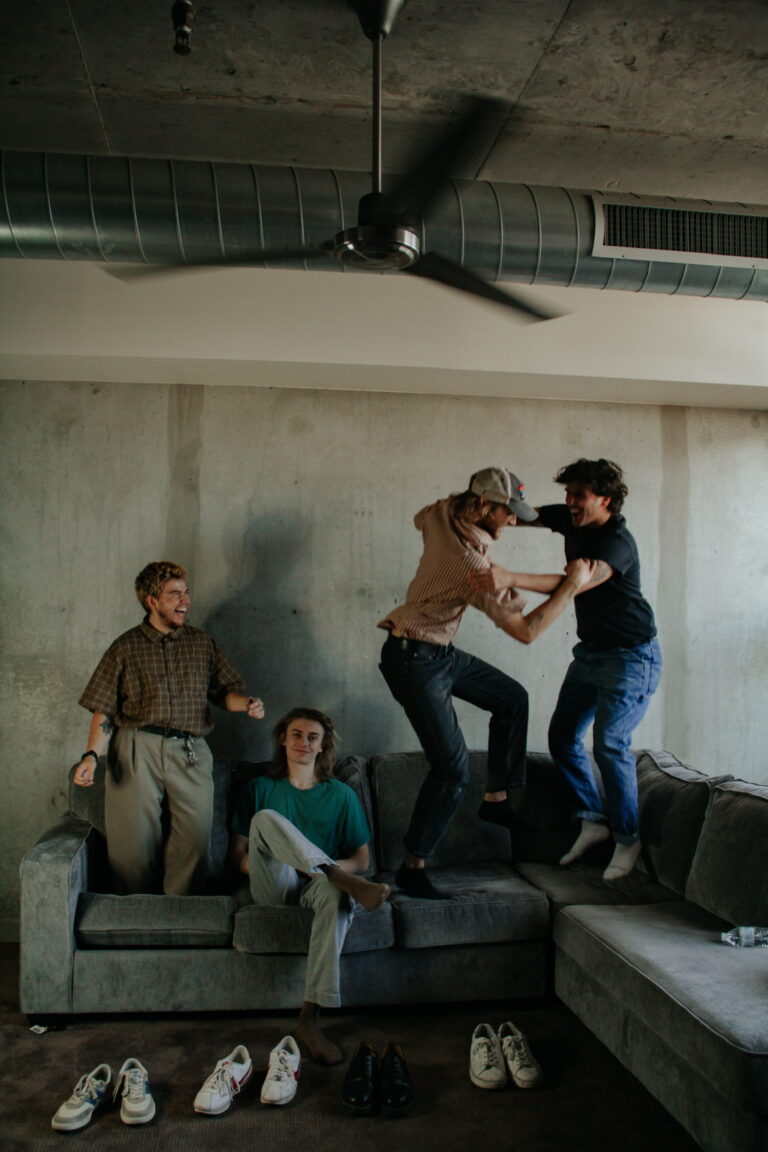
While the band is still young, they’ve been together and performing for years now. There are times where it gets stressful, or starts to take a toll on your mental health. “When it does get stressful, make sure its still enjoyable and it doesn’t feel like a job,” Patterson recounted the best advice he has gotten. “At the end of the day, I write songs because its a stress reliever for me and it brings me joy. I’m able to express myself in that way like I can’t otherwise. So whenever I get to a point where I’m like ‘This isn’t fun anymore,’ I’m able to take a break and walk away from it for a little bit and thats honestly the reason I’m still here and able to maintain a healthy relationship with it.”
“Drums are meant to be felt, not heard,” Ziegler said simply. The advice was a bit niche, but it was important to him. “There are times where you’re gonna be choppy and sometimes where you’re just gonna feel it and thats it, it serves its part.”
“I think just take every show,” Glowatski said simply, though it prompted an interesting story about one of their first shows in Prescott, Arizona.
“No one was there,” Patterson said, while Ziegler and Seiler laughed, everyone remembering the feeling of looking out into an empty crowd.
“My mom was there,” Glowatski remembered.
“Mike’s mom flew out from Pennsylvania, mike’s sister drove up from Phoenix and my niece and nephew were there and that was our crowd,” Patterson said. But, with moments like those you have to find a silver lining. “It was still fun. That was our first show outside of the valley. It was our first experience on an elevated stage and a sound system and a sound engineer. I’m glad we did it. Ive never been unhappy with the shows we did.”

I had never met a group of young men so articulate, well-spoken, and willing to be vulnerable as these four. They carry a love for each other, and a love for music that permeates deeply into their friendship and artistry. They have a bond so strong that it’s hard to believe they haven’t know each other their whole lives. Their drive and determination doesn’t just come from a ‘love of the game’, it comes from a love for one another. There is no success for one, it is for all.
Their sophomore album Only The Bad Bones Break is releasing on November 15th, with a release show in Phoenix.



